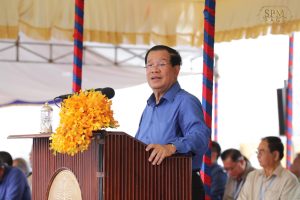Cambodia’s Prime Minister Hun Sen has seemingly backtracked on comments that a Thai government led by the progressive Move Forward Party (MFP) might expel Cambodian migrant workers from the country en masse.
In a speech yesterday in Kampong Chhnang province, Hun Sen said he welcomed the MFP’s reassurance, contained in a statement earlier this week, denying that it had any plan to repatriate foreign nationals working in Thailand.
“The information has been confirmed from the Thai side regarding rumors which have circulated that Thailand planned to expel foreign migrant workers, especially those from Cambodia and Laos,” Hun Sen said, according to the government-aligned media outlet Fresh News. “It is now confirmed that there is no such policy, so we do not need to worry.”
Thailand is host to a large population of migrant workers, who have been an important ingredient in the development of the country’s economy over the past few decades. According to one estimate, there are roughly 5 million migrant workers in Thailand, only around half of which are legally documented. Migrant work is particularly important for Cambodia; according to the Cambodian Ministry of Labor and Vocational Training, there were more than 1.2 million Cambodian nationals working in Thailand in construction, agriculture, fisheries, and food processing as of mid-2022.
In a prior speech on June 3, Hun Sen expressed concerns that a new Thai government led by the MFP, which scored a stunning victory at the general election on May 14 and is hoping to form the country’s next government, would enact policies that would jeopardize the status of migrant workers from neighboring countries.
“This policy will not be supported by Cambodia and Laos,” he said, according to Radio Free Asia. “Cambodia doesn’t have much but I want to leave a message: ‘Please watch out.’ I don’t want to advise Thai politicians but please watch out.”
Later in the week, the MFP stated on Facebook that it “categorically denies” the reports that it has a policy to repatriate migrant workers from neighboring countries.” Stating that the party “recognizes the importance of the contribution made by the migrant workforce to the economic and social development of Thailand,” it said that it wished to increase legal protections for workers from neighboring countries and make it easier for them to gain employment in Thailand.
“We aim to expand and improve regular pathways to facilitate the entry and employment of migrant workers in Thailand, provide them with appropriate protection, and ensure that such pathways are free from extortion, coercion, or other forms of exploitation,” it stated.
Why did Hun Sen leap to such a conclusion? The most obvious is that labor migration functions as a safety valve of sorts for the Cambodian government, absorbing surplus labor and preventing frustrations over rampant corruption, widening wealth inequalities, and political repression from attaining political salience.
It is thus no surprise that Hun Sen would overreact to any suggestion that workers would lose the ability to work in Thailand, something that would instantly place a huge and conceivably existential burden on his government.
The Cambodian leader may also have concerns about the foreign policies that an MFP-led government would pursue. The party’s leader Pita Limjaroenrat has previously promised to foreground human rights principles in its foreign relations, an idea that has long been anathema to the government in Phnom Penh.
Whatever the cause, the Cambodian leader’s misapprehension about the MFP’s policies demonstrates the risks of his tendency to govern via long and often improvisatory public speeches. This is not the first time Hun Sen’s extempore comments have raised eyebrows abroad, and even with his retirement likely approaching, it will not be the last.
































